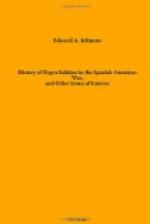We realize with sorrow and apprehension that there are elements at the South enlisted in the work of disfranchising the Negro for purposes of mere party profit. It has been so in Louisiana, where laws were enacted under which penniless and illiterate Negroes cannot vote, while the ignorant and vicious classes of whites are enabled to retain and exercise the franchise. So far as we are concerned—and we believe that the best element of the South in every State will sustain our proposition-we hold that, as between the ignorant of the two races, the Negroes are preferable. They are conservative; they are good citizens; they take no stock in social schisms and vagaries; they do not consort with anarchists; they cannot be made the tools and agents of incendiaries; they constitute the solid, worthy, estimable yeomanry of the South. Their influence in government would be infinitely more wholesome than the influence of the white sansculotte, the riff-raff, the idlers, the rowdies, and the outlaws. As between the Negro, no matter how illiterate he may be, and the “poor white,” the property-holders of the South prefer the former. Excepting a few impudent, half-educated, and pestiferous pretenders, the Negro masses of the South are honest, well-meaning, industrious, and safe citizens. They are in sympathy with the superior race; they find protection and encouragement with the old slave-holding class; if left alone, they would furnish the bone and sinew of a secure and progressive civilization. To disfranchise this class and leave the degraded whites in possession of the ballot would, as we see the matter, be a blunder, if not a crime.
The question has yet to be submitted to a popular vote. We hope it will be decided in the negative. Both the Louisiana Senators are on record as proclaiming the unconstitutionality of the law. Both are eminent lawyers, and both devoted absolutely to the welfare of the South. We can only hope, for the sake of a people whom we admire and love, that this iniquitous legislation may be overruled in North Carolina as in Louisiana.
CHAPTER IX.
SOME FACTS ABOUT THE PHILIPPINOS.
WHO AGUINALDO IS.
Emilio Aguinaldo was born March 22, 1869, at Cavite, Viejo.
When twenty-five years old he was elected Mayor of Cavite.
On August 21, 1896, Aguinaldo became leader of the insurgents. The revolution started on that day.
He fought four battles with the Spaniards and was victorious in all. He lost but ten men, to the Spaniards 125.
On December 24, 1897, a peace was established between Aguinaldo and the Spanish.
Aguinaldo received $400,000, but the rest of the conditions of peace were never carried out.
In June last Aguinaldo issued a proclamation, expressing a desire for the establishment of a native administration in the Philippines under an American protectorate.




